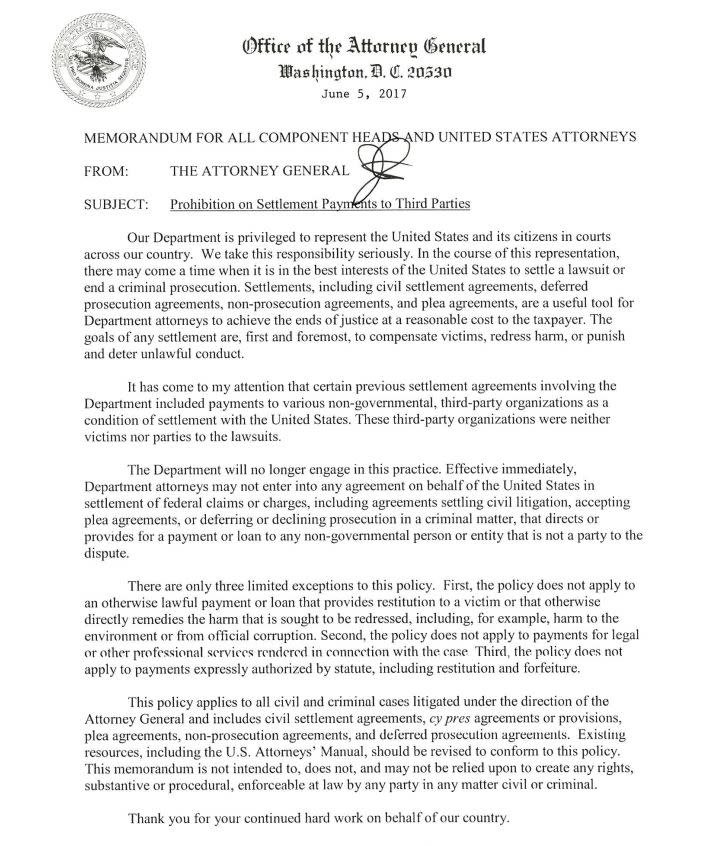Jeff Sessions Kills DOJ Settlement Practice That Funded Community Orgs

WASHINGTON ― The Trump Justice Department is banning federal attorneys from reaching settlements in criminal and civil cases that direct defendants to give money to third-party organizations, a practice that Republicans criticized during the Obama administration.
A June 5 memo from Attorney General Jeff Sessions said the DOJ would no longer reach settlements requiring payouts to “third-party organizations” that were “neither victims nor parties” to the lawsuits. In a statement, Sessions said funds “should go first to the victims and then to the American people ― not to bankroll third-party special interest groups or the political friends” of the party in power.
“Unfortunately, in recent years the Department of Justice has sometimes required or encouraged defendants to make these payments to third parties as a condition of settlement,” Sessions said. “With this directive, we are ending this practice and ensuring that settlement funds are only used to compensate victims, redress harm, and punish and deter unlawful conduct.” (A full copy of the memo is embedded below.)
The memo will hurt nonprofit groups that provide services to communities hurt by corporate wrongdoing like mortgage fraud and environmental abuses. Republicans have called out groups like La Raza, a Latino advocacy group; the Urban League, a civil rights group; and the National Community Reinvestment Coalition, which works to expand access to financial services in poor neighborhoods. Habitat for Humanity has also benefited, although that organization hasn’t come under criticism.
For instance, as part of Bank of America’s $16.65 billion settlement with the Department of Justice in 2014 (a former subsidiary of the company, Countrywide Financial, was one of the most toxic subprime mortgage lenders), the bank could donate $100 million to community and legal groups. Such donations to approved groups would then count toward the settlement’s total value.
Conservative groups portrayed the Obama administration as a shadowy slush fund for leftist organizations, hyping connections of the groups that received funding to ACORN, the Republican bogieman that was defunded after false accusations of wrongdoing.
In reality, the Department of Justice was using its settlements to help fund advocacy groups that fought for the people and communities hurt by the wrongdoing the DOJ was attempting to correct. Often, that meant funding groups that work to help the poor and minorities fight against foreclosure and help facilitate reinvestment in the communities devastated by bank fraud.
The logic of the settlement practice was that when, for instance, a mega-bank wreaks foreclosure havoc on a poor neighborhood through mortgage fraud, forcing the bank to pay groups that work on behalf of the victimized community would help repair some of the damage and make the community less susceptible to fraud in the future. The DOJ, and the entire financial regulatory apparatus, can rightly be taken to task for its light touch in the fallout of the fraud-driven housing crisis. That is a separate question from whether the coffers of corporations accused of wrongdoing might be put to use funding community groups that can help, at least in part, push back against the effects of those same corporations accused of wrongdoing.
“The Justice Department has an obligation to the people of the United States and when it brings affirmative litigation to correct wrongdoing by anyone it should be thinking broadly about remedies that help correct the harm,” Lisa Foster, the former Director of the Office for Access to Justice at DOJ told HuffPost. “With Bank of America and other mortgage-backed securities cases, the harm went well beyond the individuals involved. It went to communities and the department should be thinking about remedies that help those communities.”
One of the groups that received money from such settlements was Interest on Lawyers Trust Accounts, which provides legal aid to the poor. These groups are independently run, often by the Bar Association in a given state, and provide grants to a variety of legal aid entities.

This article has been updated to included a comment from a former Justice Department official.
CORRECTION: This article originally stated that the Legal Services Corporation received money from DOJ settlements. The LSC did not; rather, some of the money from settlements went to Interest on Lawyer Trust Accounts.
Love HuffPost? Become a founding member of HuffPost Plus today.
This article originally appeared on HuffPost.

